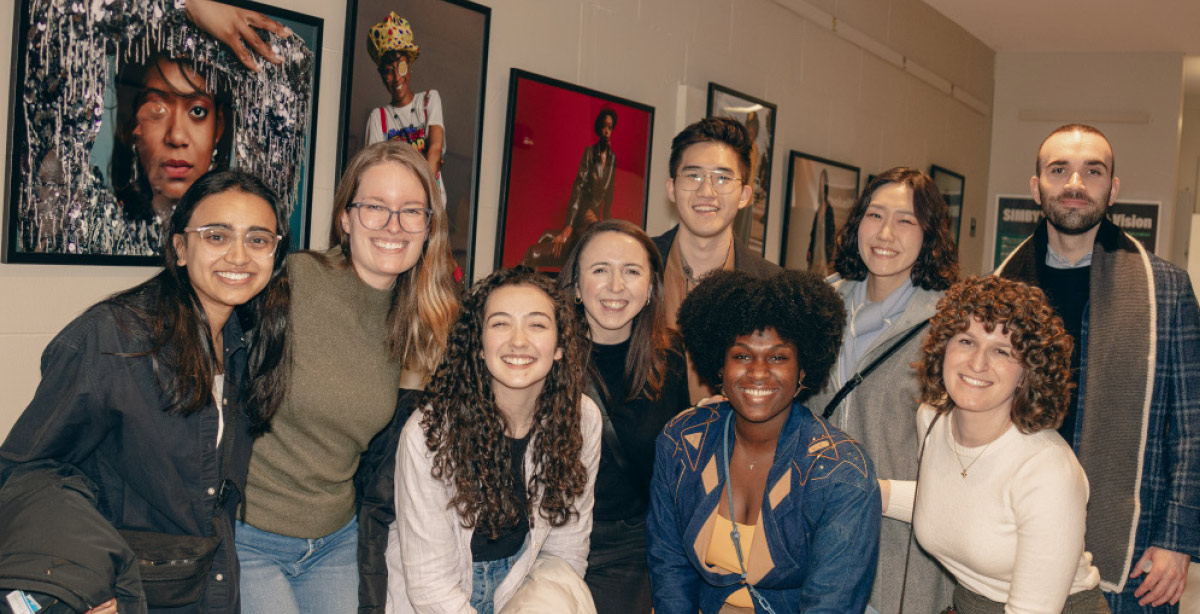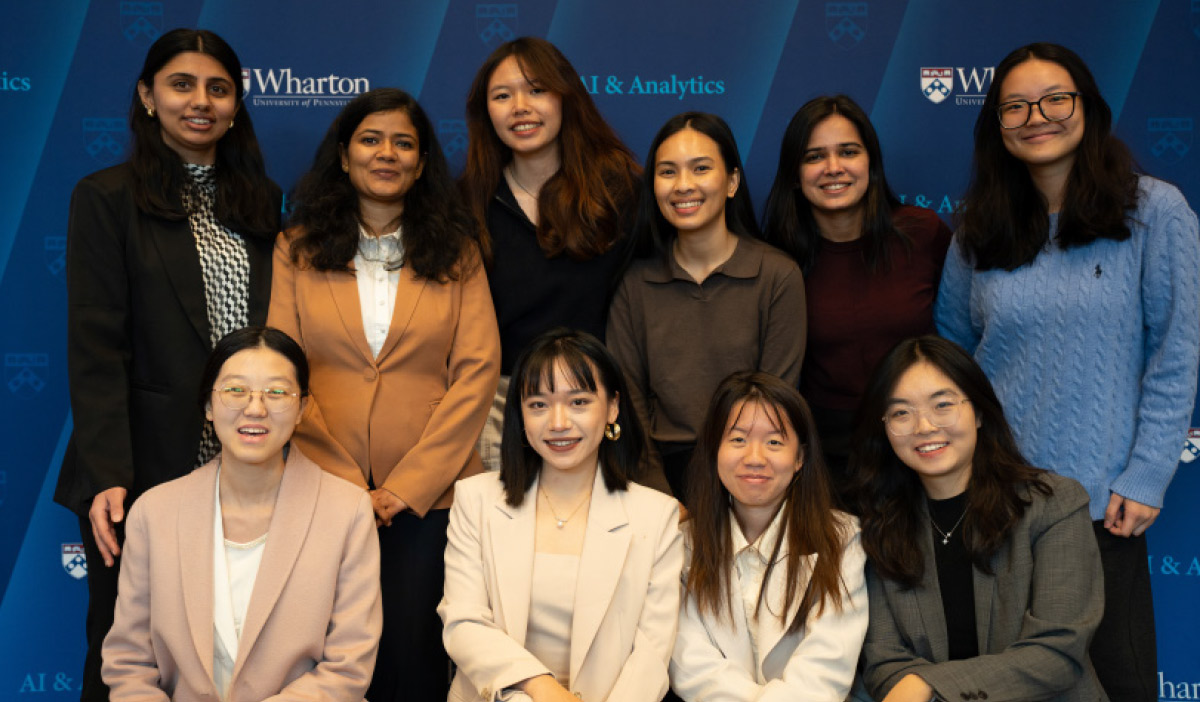News Briefs
Reimagining Representation: The SIMBY Story

Williams started SIMBY as part of her undergraduate capstone, after noticing that her NYU classmates from affluent backgrounds came to school with significant technical expertise in recording and production equipment that she didn’t have. SIMBY teaches those skills and more—culturally relevant media arts education for Black youth, the kind Williams wished she’d had before she headed off to college.
The nonprofit’s latest project is an exhibit, The Voices of Sisterly Affection, that honors the legacies of nine Black women musical artists from Philadelphia—Billie Holiday, Patti LaBelle, Phyllis Hyman, Lisa “Left Eye” Lopes, Eve, Jill Scott, DJ Diamond Kuts, Jazmine Sullivan, and Tierra Whack—by blending photography and community storytelling. What began as pandemic-era photoshoots evolved into an immersive exhibit with a virtual reality component that was on view for six months this winter and spring at the Free Library of Philadelphia. “Black women have felt seen, less alone, and even cried while viewing this exhibit,” Williams said. “I’ve seen first-hand that being an artist is revolutionary through this work.”
Williams was named a Black Music City grantee by REC Philly, WXPN, WRTI, and the William Penn Foundation in 2021 and again in 2024, which helped fund the exhibit. Her work is inspired by her hometown—the exhibit takes its name from Philly’s expanded motto, the City of Brotherly Love and Sisterly Affection—and her goal is to continue to nurture the next generation of local Black storytellers. “There’s no better time than now to amplify their voices—and no better place than home,” she said.
At the exhibit’s opening reception in February, Williams was moved to see so many of her Penn GSE professors and classmates in attendance. “The support of this community has been so genuine and game-changing for me,” she said. “I feel so welcomed and embraced for my unique approach to my doctorate as a multimedia artist and social entrepreneur!” For more: penng.se/simby
Penn GSE Teams Finish Strong at Wharton Hack-AI-thon

One team—featuring Learning Sciences and Technologies (LST) students Jyoti Poonia, Catherine Roeroe, Sakshi Singh, and Amanda Tran, along with Teaching, Learning, and Leadership student Ruchi Arora—developed Agora, an AI-powered classroom orchestration tool designed to foster intentional, meaningful dialogue. The other—featuring LST students Siyun Chen, Xinyue Cui, Haowei Li, and Shiyang Zhang, plus Penn Engineering student Sen Liu—created Echolearn, a personalized AI companion that helps users deepen their understanding of any study material by prompting them to explain and teach it.
“My learning from this experience has been truly incredible,” said Arora. “One of the most powerful aspects was witnessing how each team member—regardless of background—contributed meaningfully. . . . We worked on a real-world challenge, which made the experience even more impactful. It encouraged us to think strategically—not only about the problem at hand, but also about how education might evolve in the future.”
Of the roughly 40 teams competing, the Agora team was one of six finalists in the AI for Education Challenge, and Echolearn was one of two finalists from a field of 15 in the Prompt Hacking Challenge. The finals were judged by Wharton Lecturer and nine dots CEO Geoffrey Klein, GEP Worldwide President and Co-founder Neha Shah, C’99, W’99, WG’06, Glymer CEO Jeff Greenhouse, W’99, and former partner at KPMG Brian Hughes, W’81, WG’91.
“I saw this as a great opportunity to learn from the judges,” said Chen. “Their feedback helped broaden and deepen my understanding of what it really takes to create an effective AI-based learning solution—both in terms of educational theory and practical value.”
“The most significant takeaway for me from this experience was how we translated classroom theory into a real-world, AI-driven application,” said Poonia. “I’ve been working on AI-related projects across classes this semester, and it was incredibly meaningful to apply those learnings in this way. I feel more connected to my program than ever, as this truly embodied what Learning Sciences and Technologies is all about.”
PennCLO Podcast Shares Success Stories
The Practitioner–Scholar: The PennCLO Podcast features a rotating cast of hosts including current and former PennCLO students, interviewing guests about their professional journeys. Produced in partnership with Jennifer Neumaier, GRD’20, and Alumni Podcasts, each episode is tied to timely issues, shares groundbreaking research, or highlights impactful projects.
“The podcast serves as an extension of the PennCLO program by highlighting the practical applications of our curriculum and the real-world impact of our community,” Neumaier said. “It showcases the caliber of our students and alumni and the transformative experiences they undergo at Penn GSE.”
The first season featured episodes on managing stress in high-stakes environments, AI-powered learning, and burnout immunity. Guests share their journeys, peppered with actionable advice. For example, one episode featured Carla Thomas, GRD’19, former WNBA player and current consultant, sharing how organizations can reduce workplace tensions and create more supportive environments.
The podcast began with a pilot run of six episodes and is now in the middle of its 12-episode second season.
 LISTEN TO THE PRACTITIONER-SCHOLAR on Spotify, YouTube, Apple Podcasts, Amazon Music, or here: penng.se/clopodcast
LISTEN TO THE PRACTITIONER-SCHOLAR on Spotify, YouTube, Apple Podcasts, Amazon Music, or here: penng.se/clopodcastPrized Paper

PennCLO Podcast Shares Success Stories
The Practitioner–Scholar: The PennCLO Podcast features a rotating cast of hosts including current and former PennCLO students, interviewing guests about their professional journeys. Produced in partnership with Jennifer Neumaier, GRD’20, and Alumni Podcasts, each episode is tied to timely issues, shares groundbreaking research, or highlights impactful projects.
“The podcast serves as an extension of the PennCLO program by highlighting the practical applications of our curriculum and the real-world impact of our community,” Neumaier said. “It showcases the caliber of our students and alumni and the transformative experiences they undergo at Penn GSE.”
The first season featured episodes on managing stress in high-stakes environments, AI-powered learning, and burnout immunity. Guests share their journeys, peppered with actionable advice. For example, one episode featured Carla Thomas, GRD’19, former WNBA player and current consultant, sharing how organizations can reduce workplace tensions and create more supportive environments.
The podcast began with a pilot run of six episodes and is now in the middle of its 12-episode second season.
 LISTEN TO THE PRACTITIONER-SCHOLAR on Spotify, YouTube, Apple Podcasts, Amazon Music, or here: penng.se/clopodcast
LISTEN TO THE PRACTITIONER-SCHOLAR on Spotify, YouTube, Apple Podcasts, Amazon Music, or here: penng.se/clopodcastPrized Paper

Campus Workshop Explores AI Innovation in K–12 Education

The workshop assembled participants from across the US and Europe, including industry representatives from Google, Apple, and the Raspberry Pi Foundation. Discussions centered on how AI can be integrated into school curricula, what teachers need to facilitate AI creation in classrooms, and how learning outcomes should be assessed. Panelists also addressed ethical considerations, such as algorithmic bias, and the importance of AI literacy in fostering responsible innovation.
Organizers announced plans to release a comprehensive report, expected this summer, that will guide future research, policy, and curriculum development in integrating AI as a hands-on, creative discipline in schools.
For more: createai-workshop.com